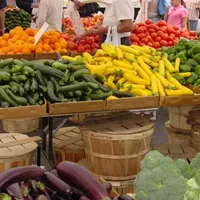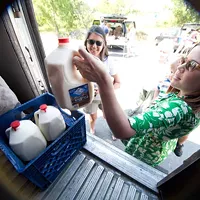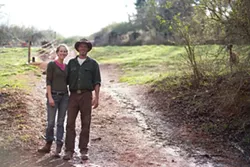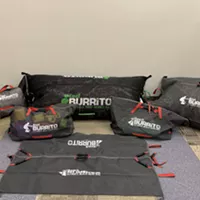Aaron Cookson hasn't quite finished carving out the road to his house.
"See, we pulled a stump out right here before this rain started," the 38-year-old says with one hand relaxed on the wheel, as his old Jeep bounces out of a deep rut and fishtails toward a tangle of forsythia. From the backseat his daughter Maple, 4, leans forward, suddenly concerned, but not about the drive.
"Papa," she whispers, "don't forget to tell about the baby chickens."
The Jeep slides around a final curve into a clearing and the chickens — along with goats, greenhouses and a vaguely disdainful orange cat — come into view. The Cooksons' home is a homestead — completely hand-built, completely off-grid, and gearing up to bring its harvests to metro Charlotte. Aaron and his wife Holly grow and preserve about 80 percent of their own food, including vegetables, fruit, meat, eggs, dairy and grains, and trade products with nearby farming friends for much of the rest. The house is powered by a three-panel solar energy system that Aaron installed. A large wood-burning stove in the basement radiates heat up through the floorboards to ward off the early-spring chill, and a solar-powered pump delivers water from a hand-dug well to the house, animal sheds and irrigation systems. They get around the plumbing issue with a composting toilet, and wireless phones — kept charged with the house's solar power — provide Internet hot spots. "In a lot of ways," says Aaron, "we're caught between two worlds."
It's a setup that's self-powered and self-sustaining — and part of a rising tide.
The Cooksons are early adopters of grid defection, a growing phenomenon whereby alternative energy sources like solar power coupled with the increasing capabilities of battery power storage compete with traditional utility services. The Cooksons have two batteries connected to their solar panels, which allow the system to store extra energy for later use, such as saving up power during long, sunny summer days to run cooling fans all night. Because of continuing advancements in battery storage — newly developed vanadium flow batteries, for example, can store enough solar energy to power an entire commercial-scale farm and were adopted by one of McDonald's produce suppliers, Gills Onions, in 2012 — some industry analysts think systems like the Cooksons' could become the new normal.
For the majority of North Carolina electric utilities, solar PV systems smaller than 10 kilowatts (rooftop solar panels) will achieve grid parity or become cost-competitive with residential retail electricity prices in 2020 (with federal and state tax credits). "The power grid might become the alternative, and off-grid the norm," The Rocky Mountain Institute, a sustainability research nonprofit, stated in a national report on grid parity released in February.
Aaron and Holly began slicing their way back into the patch of woods in Ellenboro, about 45 minutes northwest of Charlotte, in 2006, when land inherited from Holly's grandparents gave the couple's "romantic Jack London-esque vision of living off the land" the chance to become a reality. Barbara Kingsolver's book Animal, Vegetable, Miracle, which argues the importance of local-food traditions in the face of modern industrial agriculture, inspired them to eat only food sourced within 100 miles of their home for six months. By 2007, the initial challenge became a way of life. The beginning was more rough than romantic — for five years they lived in a small Silver Streak camper, working day jobs in carpentry and construction, making do with a tiny six-gallon water heater and getting their small farm, Red Dirt Ranch, off the ground.
Maple was born when they were still living in the camper, and there were years marked by damaging storms and disappointing harvests, years when their ties to the land felt more like tethers. "There were times when we felt trapped," Aaron admits. "There were times when I thought I was going to give up. But deep down, even in the times we thought we hated it, underneath there has always been a love of what we're doing."
The camper is long gone now, replaced by a two-story house that the Cooksons built after cutting down trees on their land and milling the timber themselves. As Holly steps around a 1930s wood-burning stove to pour "a really interesting beet beer" into vintage glasses, it's tempting to see Red Dirt Ranch as a sepia-toned portrait of days gone by. But a solar panel glints from outside the kitchen window, and Aaron's cellphone chirps periodically from a mud-streaked pocket.
The Cooksons have to generate some external income to add to their solar energy system and expand their farm's off-grid capabilities. (Aaron wants to eventually add solar-powered freezers for storing meat, and the family misses having a clothes washer and dryer, which the current 80-watt system can't handle. They currently use a laundromat a few miles away rather than hand-washing, since, Holly says laughing, "we had to draw the line somewhere.") They plan to do so by setting up shop at Charlotte farmers markets beginning in May, something they haven't been able to do for the past year.
"I remember the first time we went to market [in 2007]," says Aaron. "There was such a sense of satisfaction and connection with the community. We were driving home grinning at each other, going, 'We're gonna make it!'" The Cooksons stopped selling products at Charlotte Regional Farmers Market and Atherton Market in 2013 to try to start a new farming venture with friends, but "it didn't work out, and it took a year to sort out some of the inefficiencies on the farm," he says.
They've since improved the way they raise chickens, building mobile wire runs so meat birds can live on pasture without being scooped up by predators, and planted more crops, including blueberries and wheat. But returning to the market holds challenges posed by the venues themselves. Charlotte Regional has few restrictions on sellers, meaning some booths are filled not by local farmers but by "resellers" who buy wholesale produce from warehouses and often undercut farmers' prices. "It will be hard to re-establish our spot there," says Aaron.
Atherton Market scrutinizes vendors and focuses on local growers and small businesses — market manager Lynn Caldwell says she has refused booth space to warehouse resellers — but charges sellers a percentage of gross sales rather than the flat per-day fee used by Charlotte Regional. For small farms like Red Dirt Ranch, Holly says the flat fee is usually easier on the bottom line.
Still, says Aaron, the decision to go back to the farmers market at all has more to do with community than with economics. "We could do this for ourselves without producing anything for the public, without adding anything," he says, squinting into the sunlight that's broken through between rainstorms as he works his way through a craggy pasture in front of the house. He pauses briefly to let a nanny goat use him as a scratching post. "We could be here completely on our own, but we enjoy being part of community."
Aaron reaches a shed at the edge of the pasture, leaning over the gate to peer into the shadows. Springtime moves quickly on a homestead, and in addition to Maple's "baby chickens" are two just-born kid goats wobbling in the straw, their fur still wet and their mother not especially happy about the current number of visitors. The Cooksons are considering selling some of the goat milk for soap-making at the farmers market, but for now the new arrivals are bleating softly and dozing off, unaware that they might play a part in local sustainable toiletries.
Speaking of...
Latest in News Feature
More by Sara Patterson
-
N.C. lawmakers criminalize disclosure of fracking chemicals
May 23, 2014 -

SNAP out of luck
May 14, 2014 -

Got raw milk?
May 14, 2014 - More »




















